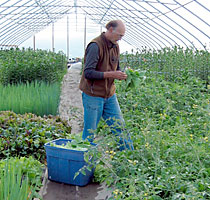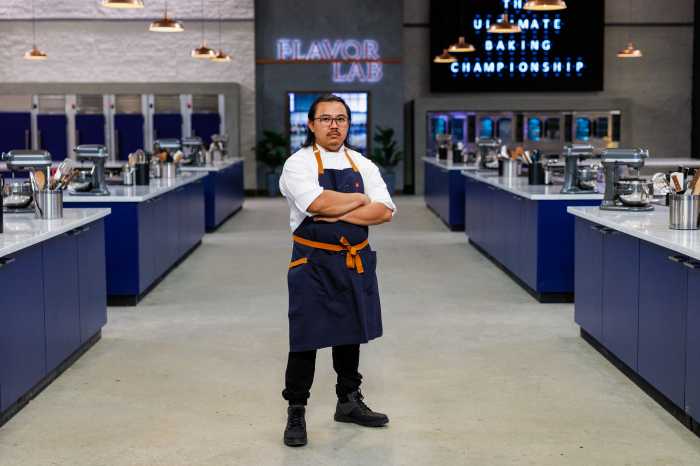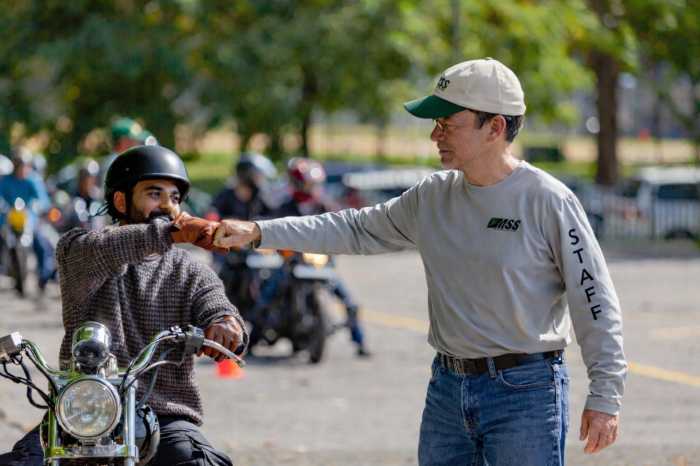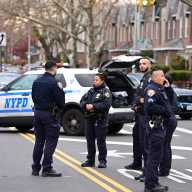Heads up, Brooklynites: you can still join
a Brooklyn Community Supported Agriculture group. You’ll be supporting
family farms, while saving money on your grocery bill – but time
is running out for the 2006 season.
A "CSA" is an organization whose members buy cooperative
shares in a small, organic farm in advance of the harvest season,
which runs from June to November. These shares provide the farmer
with a guaranteed income from his or her produce. In return,
members get fresh-picked organic produce delivered to their neighborhood
every week, at a savings.
According to Judy Janda, co-founder of the Park Slope CSA, when
the group formed seven years ago, most people she approached
about joining had no idea what a CSA was. Community awareness
of CSAs has increased dramatically since then, she said.
"We had a table at the Fifth Avenue Street Fair, and I handed
out 80 flyers. Most of the people who came by already knew about
CSAs," said Janda.
Community Supported Agriculture is not a new idea, but it’s one
that has become increasingly popular in Brooklyn and other urban
areas, where organic produce is expensive, often hard-to-find
and sometimes none too fresh.
"Back in Indiana, we used to call them ’truck farms,’"
jokes Carl Lawrence, a CSA member from DUMBO. Lawrence, a father
of two and producer of GreenVision, a weekly TV show on environmental
politics on Brooklyn Community Access Television, says his two
primary reasons for being a CSA member are "to get the freshest
produce at the best price, and to support family farms."
"Corporations like Con Agra and Archer Daniels Midland are
swallowing up family farms, using pesticides, irradiation and
genetically manipulated seed. This is a way to fight back,"
said Lawrence. "And you couldn’t have [produce] any fresher
unless you grew it yourself."
Brooklyn CSAs generally have 35 to 100 members each. Shares range
from $260-$450 for 23 weeks of organic vegetables and herbs,
often with a sliding scale depending on income. Many CSAs accept
food stamps.
The most comprehensive resource on local CSAs is Just Food, a
Manhattan-based nonprofit dedicated to fostering CSAs, community
gardens and city farms. Just Food also helps CSAs provide assistance
to the homeless and lower income families.
The weekly share is expected to be enough fresh vegetables for
a family of four. An assortment of what’s currently in season,
usually around eight different kinds of vegetables, is set out
in bins and members select what they like.
Fruit, egg and flower shares are also available, and some farms
offer extra shares of tomatoes and other produce for canning.
Organic cheeses and free range, antibiotic-free meats are also
available by special order through most CSAs.
Ted Blomgren, whose 38-acre Windflower Farm in the upstate New
York town of Valley Falls provides vegetables to CSAs in Park
Slope, Prospect Heights and Clinton Hill, says that he grows
"an extremely wide variety of crops" like greens, tomatoes,
beans, root vegetables, herbs, potatoes, squashes and flowers.
A flock of 450 chickens provide eggs for CSA members and fertilizer
for the gardens.
Blomgren says CSA farms "sell a different product"
than other organic farms, which cater to farmers’ markets, health
food and grocery stores.
"We sell 23 weeks of vegetables," said Blomgren. "We
find out what people like … and that’s what we try to give
them." By contrast, most organic farmers tend to "specialize
in what’s profitable," says Blomgren. Specializing can bring
bigger profits, but it makes the farms more vulnerable to pests
and weather problems.
Blomgren is a little worried about the cold, wet start to the
season, but says that "greens and root vegetables will do
well" in a year like this one. The CSA members, as shareholders,
"share in the risk" of some crops falling short due
to bugs or bad weather. Still, the diversity of the plantings
assures that there will always be plenty of produce.
"I want to make sure there’s a good share on June 15,"
said Blomgren. "I know if I don’t make people happy this
year, they won’t join again next year."
The CSA contract is made directly between the farmer and CSA
members.
"The farmer came into the city regularly, personally, to
deliver the vegetables," said Lawrence of his experience
in previous years. Many members come to feel a close kinship
with the farm where their food is produced, visiting to take
a tour, or attending fall harvest festivals with their families.
Other CSA members just like getting a good deal.
"Some of the people treat the CSA like a store," Lawrence
says. He admits that the scheduled pickup time "can be inconvenient,
depending on the location." He recommends joining a CSA
close to home.
"There’s always someone who doesn’t pick up his share"
on a given week, said Lawrence, so unclaimed produce is donated
to City Harvest and other soup kitchens.
Typically, all members are required to volunteer a certain number
of hours each season (in Park Slope CSA, it’s five), helping
to sort vegetables, unload the truck or assist other members.
Volunteers who want to become "core members" of their
CSA can often earn free or discounted shares by working extra
hours.
Volunteering at the weekly drop-off "can be a fun way to
meet other members," said Park Slope CSA’s Janda.
Brooklyn families, Lawrence believes, benefit from CSAs, an affordable
source for fresh food that’s free of pesticides.
"They’re absolutely healthier," he claimed. Equally
importantly, said Lawrence, "It’s a way of keeping family
farms alive; that’s always good for the community."
Park Slope CSA’s distribution site is
Garden of Union, Union Street between Fourth and Fifth avenues
in Park Slope. For more information, write to 172 Fifth Ave.,
PMB #50, Brooklyn, NY 11217-3504, call (718) 707-1023 or visit
the Web site www.parkslopecsa.org.
Shares: $260-$460. Deadline to register: ongoing throughout the
season until filled.
Clinton Hill CSA’s distribution site is PS 56 Lewis Latimer School,
corner of Gates Avenue and Downing Street In Clinton Hill. For
more information, write to P.O. Box 050377, Brooklyn, NY 11205,
call (718) 907-0616, or visit the Web site www.clintonhillcsa.org.
Shares: $156-$414. Deadline to register: June 15.
For more information and a listing of CSAs by neighborhood, contact
Paula Lukats at Just Food, 208 E. 51st St. at Third Avenue in
Manhattan, (212) 645-9880, ext. 233 or visit the Web site www.justfood.org.

























